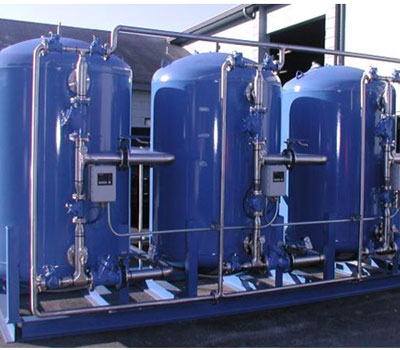Industrial Water Conditioner

We call water "hard" if it contains a lot of calcium, magnesium and other minerals.Carbonate hardness is known as temporary hardness and non-carbonate hardness is known as permanent hardness. When a calcium or magnesium ion reacts with carbon dioxide, found in ground water or the atmosphere, calcium bicarbonate or magnesium bicarbonate, respectively, is formed. This reaction creates “hard” water.
Hard water causes two problems:
1. Dissolved calcium and magnesium precipitate out of hard water as scale, which builds up on the insides of pipes, water heaters, pumps and industrial machinery. Scale reduces flow through pipes and is a poor conductor of heat. Eventually, pipes can become completely clogged.
2. The performance of boilers, cooling towers and other associated equipment is adversely affected by scaling.
Water softeners used in industries are specifically designed ion exchangers that can remove positively charged ions such as magnesium (Mg+2) andcalcium (Ca+2).
A water softener removes the hard minerals in the water and replaces them with soft minerals, like sodium or potassium salt base minerals.
We are the leading supplier of industrial water softeners.With our qualified professionals, we are able to offer systems customized to our customer’s requirements.
Features:
• Less salt and water consumption during regeneration
• User friendly, programmable time clock or metered regeneration
• Soft water refill for a cleaner brine tank
• Super capacitor prevents memory loss due to power interruption
• Service and queued regeneration faucet icon
• Optical sensor for precision cycle positioning
• Designed with double backwash for reduced hardness leakage
Benefits:
• Saves Energy: Minerals will no longer clog pipes. Water-using equipment will be free of scale buildup, last longer and perform more efficiently resulting in energy savings of up to 30%.
• Saves Money: You can reduce utility bills, labor costs, maintenance costs and equipment expense.
• Enhances Customer Experience: Customers will notice spot-free tableware and glassware, softer towels and overall cleaner facilities.
• Improves Taste: The resonator reduces chlorine taste and odor, improving the quality of food and beverages.
• Reduces Detergent and Chemical Use: Softened water has no mineral hardness to react with or overcome, reducing detergent and chemical requirements by up to 50%.
• Increases Equipment Lifespan






